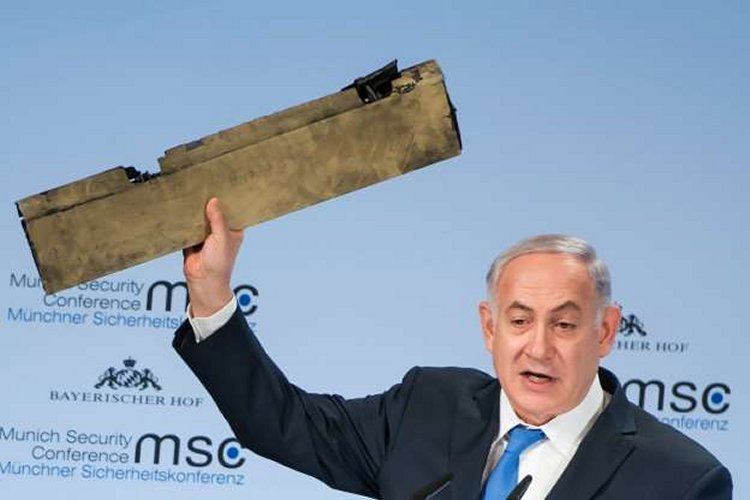 Benjamin Netanyahu at the Munich Security Conference. © lennart preiss/Agence France-Presse/Getty Images |
 Benjamin Netanyahu at the Munich Security Conference. © lennart preiss/Agence France-Presse/Getty Images |
Israeli Prime Minister Benjamin Netanyahu warned Sunday that his country will hit Iran directly if Tehran uses Syria to test Israel.
Describing Iran as the greatest threat to world security, Mr. Netanyahu brandished what he said was part of an Iranian drone sent from Syria last weekend.
"Last week its brazenness reached new heights" he said. "We will act without hesitation to defend ourselves. And we will act if necessary not just against Iran's proxies but against Iran itself."
In a major escalation that brought Iran and Israel to the brink of direct conflict Israeli jets launched airstrikes in Syria last weekend after an Apache helicopter shot down the Iranian drone.
Syrian antiaircraft missiles then shot down an Israeli F-16 fighter aircraft, the first time Israel had lost a jet in more than 30 years, and Israel then launched another larger attack on Iranian and Syrian military sites. The strikes took out half of Syrian President Bashar al-Assad's air-defense capabilities, Israeli officials said.
At a normally staid security conference, Mr. Netanyahu held up what looked like a battered piece of the wing of an aircraft.
Lifting the wing above his head, Mr. Netanyahu taunted the Iranian foreign minister, who was set to address the conference later Sunday.
"Here is a piece of that Iranian drone, or what is left of it after we shot it down," Mr. Netanyahu said. "I brought it here so you can see it for yourself. Mr. Zarif do your recognize this? You should. It's yours. You can take back a message to the tyrants of Tehran. Do not test Israel's resolve."
Speaking later, Mr. Zarif accused Mr. Netanyahu of staging a "cartoonish circus" and said the Israeli leader was trying to evade the issue of what he called almost daily Israeli bombardments of Syria.
Mr. Netanyahu repeated his accusations that Iran is trying to establish military, naval and air bases in and around Syria and build precision guided missile factories in Lebanon to supply Hezbollah.
"Iran is trying to change the status quo both in Lebanon and in Syria, If they don't change the status quo then I think peace will be preserved—or at least nonbelligerence," he said.
Iranian officials have said they don't want to escalate the situation in Syria. Tehran has accused Israel of violating Syrian airspace with past strikes and has said its forces are in Syria on the invitation of the Assad regime.
Speaking in Munich on Saturday, U.S. national security adviser Gen. H.R. McMaster said now is the time to confront Iran's regional behavior, accusing it of building and arming a network of proxies across the Middle East to further Tehran's goals.
Also Saturday, European governments, including Britain, France, Germany and Italy sat down with a senior Iranian official on the sidelines of the Munich conference to discuss regional conflicts, the first concrete move by the EU to persuade Washington it takes Iranian threats seriously.
European governments are hoping to persuade Washington not to abandon the 2015 Iranian nuclear deal, arguing there are other ways to confront Iran's regional muscle-flexing.
On Sunday afternoon, Mr. Zarif said Iran won't be the first to breach the 2015 nuclear deal, which saw Iran significantly scale back its nuclear program in exchange for the lifting of most international sanctions.
However, he warned that if the U.S. does abandon the deal, Iran will act.
"If Iran's interests are not secured, Iran will respond, will respond seriously and I believe it would be a response that people will be sorry" for having triggered, he said. He didn't elaborate.
Write to Laurence Norman at laurence.norman@wsj.com and Julian E. Barnes at julian.barnes@wsj.com